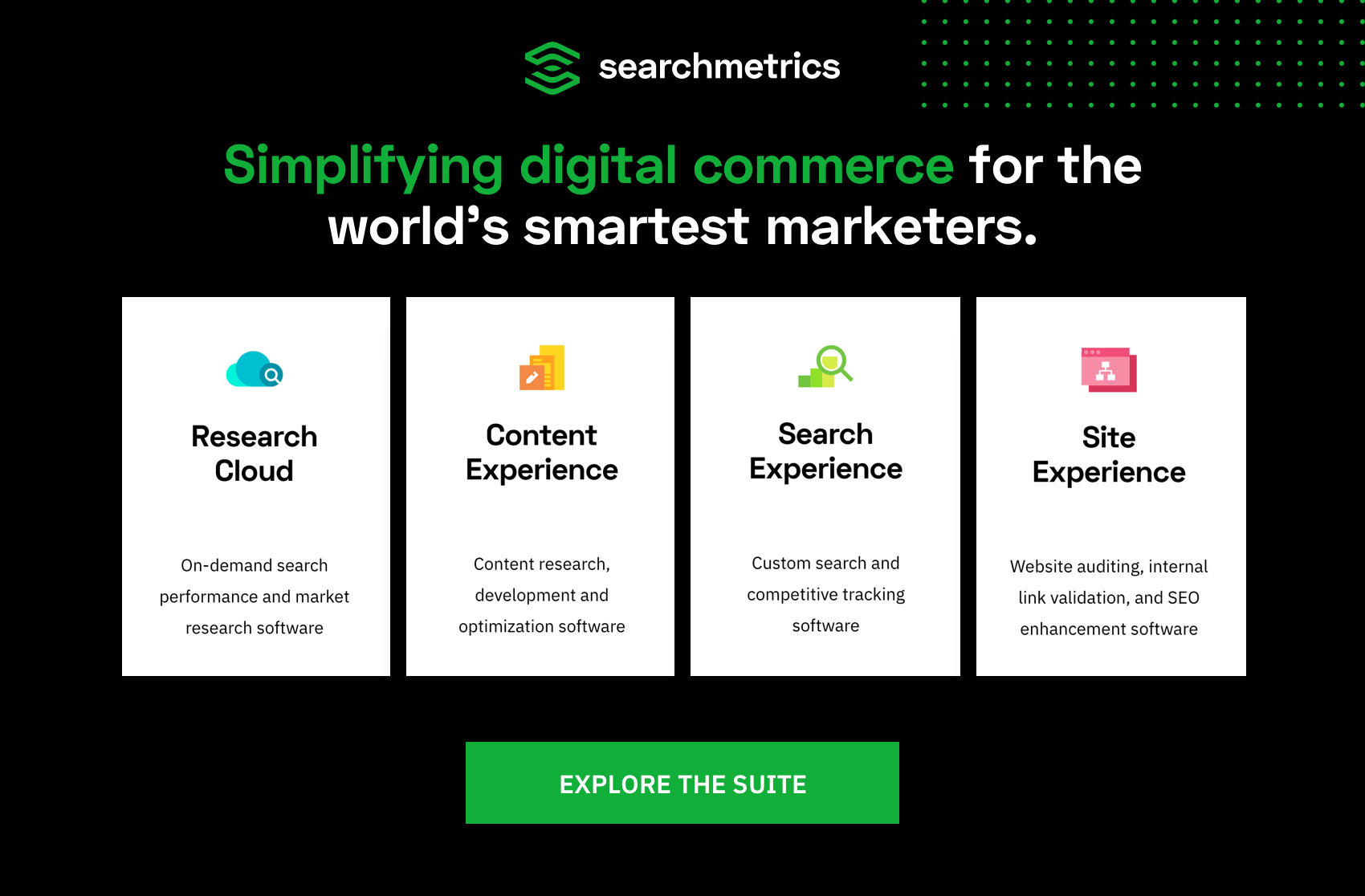Searchmetrics recently held a webinar discussion with company CMO Doug Bell, Strategic Advisor Jordan Koene and Searchmetrics’ Director of Services Tyson Stockton on the current landscape of digital marketing as the COVID-19 pandemic continues. The team covered essential SEO tactics businesses need to know to survive, provided expert advice and answered pressing questions from users.
Missed the webinar? Here is a summary of essential topics and vital tips covered during the webinar that you can immediately use to put your company on the path toward SEO success.
Watch the webinar on-demand today
How to Fortify Your Digital Foundation
With the COVID-19 pandemic forcing consumers online and companies to rely on their digital marketplaces, maintaining a strong digital foundation is the key to success. A digital foundation includes, but is not limited to, all paid search, paid social, organic social and email campaigns.
Knowing where to start with strengthening and reinforcing your digital strategy varies depending on the brand or company, the audience you’re trying to reach and the type of product or service you offer. Concentrating focus on three fundamental areas in your digital strategy not only improves SEO but also boosts conversion rates.
- Improving content quality.
- Optimizing and enhancing your website’s performance.
- Inserting high quality links and removing dead or low performing links.
Jordan Koene advised that having an innovation mindset when focusing on the fundamentals is critical for businesses aiming for longevity.
“I’m really convinced innovation is a key component to really succeeding in this crisis. The creative components, the ways businesses are adapting and changing are absolutely fundamental to growth. I’ll give some examples. We’ve seen the travel industry really have to adapt through this crisis, be proactive in their communication in terms of whether or not they’re offering flights or rooms, they’ve had to be creative in communicating policies…and the way this impacts SEO is there’s a full-fledged experience happening on the consumer end and customers expect a higher degree of experience with brands who are communicating and being vocal. It’s an innovation in an industry that largely has not had to be proactive about communicating things. Innovation for large and small businesses is incredibly important right now, you have to be finding new ways to communicate with consumers and expand your content as consumer behavior changes.”
When to Invest in Digital or Reduce Spend
A difficult decision large and small companies are currently facing is whether to invest in digital or reduce their digital spends. Caution is understandable, but as more consumers increase their reliance on online services it’s vital to invest in some digital strategies regardless of company size. Larger companies with sufficient funds should fully invest in digital, but smaller businesses that don’t have significant funds need to strategically examine what digital channels and strategies they can invest in.
Tyson Stockton sees the benefit to cutting and investing depending on a business’ capabilities.
“I’d say both. What I mean by that is, my gut answer in the beginning is don’t cut. If you’re a large company with the reservoir and funding to weather the storm, now is the time to invest…if you’re in a position to be aggressive do that. The reality of the situation for a lot of us is there’s a lot of smaller companies and businesses with layoffs, reduced hours and constricted budgets…if you’re one of those companies with limited resources you may have to make tough decisions. If you have to cut, I’d look at paid search, namely brand terms. You’ll likely get a lot of that traffic through organic anyway.”
CMO Doug Bell advocates for B2Bs to shift focus from bottom of funnel digital endeavors to top of funnel as it’s more affordable and resonates more with consumers looking for educational content.
How to Evaluate Paid Vs. Organic Marketing Priorities
As consumer behavior shifts to increased reliance on online services, companies are prioritizing consumer engagement in their SEO strategies. Paid and organic SEO are two different, valuable methods to engage consumers online. Paid search provides immediate growth in the moment, but organic search is better suited for long-term engagement and brand growth. Organic is also better suited to weather the uncertainty the COVID-19 pandemic presents, providing long-term opportunities for brand growth compared to the strain paid search can place on constrained marketing budgets.
Tyson admits it’s a difficult choice, but argued that organic is a long-term strategy that ultimately pays off.
“It’s a tough choice, but I’d consider what has an impact today and later in the year. If you’re investing in organic now, it provides value now but also later in the year, like Q4, where organic is driving more traffic overall compared to paid spend, so if I was picking, I’d pick SEO in that sense for the organic piece cause I want to make sure I’m maximizing opportunities today and more importantly looking later in the year when things might be stronger and business comes back. Yes, paid has immediate benefits but it’s only going to last as long as you’re making that spend.”
How to Emerge from the Crisis Stronger Than Before
It’s possible for any business armed with the right information, successful tips, and strategies to emerge from the pandemic stronger than before. One of the best things companies can do starting right now is create strong partnerships with other brands to help lift yourself out of a challenging position. Thinking of ways to create a fruitful partnership and evaluating how your audience might view the relationship is a critical element to increasing partnership momentum.
Jordan elaborated on the inherent positive value of partnerships.
“We’re already seeing hotels partner with cleaning companies like Lysol to help disinfect the entire hotel…the reality is these partnerships matter, they’re going to help transform the way consumers perceive these businesses, industries, travel and tourism, give them some security and safety. Partnerships help at the local level with small businesses giving back to hospitals, like bakeries and coffee joints donating coffee and donuts, those things are remembered by consumers and constituents, which can pay dividends in the long run.”
Another aspect is knowing how to balance drive and decrease fatigue among teammates. Work from home has afforded some privileges and alleviated certain stressors although it still poses unique challenges. Tyson advised taking a professional and personal approach in this manner
“One important piece here is it’s not a time to let up. Don’t completely scrap your roadmaps and plans. Certainly re-evaluate, take a critical eye and ask whether if it fits with where the world is going, but stay focused. Also be mindful of team members and fatigue. Make sure that the team is still motivated and that they can continue working through this. Check in on a personal and professional level.”
Keeping an eye on the latest Google algorithm updates is another key metric to long-term success. Jordan advised that the No. 1 thing companies should watch for in upcoming Google algorithm updates is how they’re modifying the SERP and how it affects your business. Closely monitor the changes Google makes to Google My Business, SERP carousels and other elements to see what’s being prioritized and adapt your strategy accordingly. Stay nimble and innovative to adapt quickly.
Pitfalls to Avoid
Encountering pitfalls is common if you’re not sure what to look out for during a period of uncertainty. Making unfounded, radical adjustments to your strategy is ill-advised and any changes you make to your strategy should be data informed. Although data is questionable given the current state of economic fluctuation, Jordan emphasized that data-informed decision making should still take precedence.
“Don’t just trust your gut, and I know data is super volatile and murky right now, but there’s still a tremendous amount of data provided in Google Search Console and other places in how these changes are impacting your business.”
Another radical change to avoid making is firing an agency you’re working with and signing on with a new one. The startup costs can be astronomical and can eat a significant chunk of your funding. Focus on improving existing partnerships by cleaning up communication channels or creating new ones that work better for current circumstances.
Audience Q&A
- If you were starting a new content strategy right now what would you make sure to do and consider from an SEO standpoint? – The best place to start would be to connect your target audience with your product. There are many different ways you can accomplish this with content. Think about the mediums and channels you want to connect with consumers and concentrate efforts in those areas.
- What strategy do you think companies have to do between before the coronavirus and after it so by the way of retail wouldn’t be in Chapter 11 like Macy’s? – Companies like JC Penney that were already in trouble before coronavirus saw the pandemic activate and speed that inevitable process along. Their visibility has steadily decreased over the past three years and now that their brick and mortar is closed it sealed the deal. Ecommerce has increased but not retail ecommerce. The failure to focus on online visibility and creating a valuable user experience is what’s tanking many traditional retailers. The notion that increasing online visibility was important before the pandemic but at present it has become absolutely essential to survival.
- Do you have any tips or articles on how to motivate SEOs during the crisis? – Focus on your internal team, stay close with them on a professional and personal level. Understand what they’re going through, what’s their motivation and don’t ignore that aspect. Evangelizing SEO is harder now as well and having an open communication plan with key touchpoints and objectives is crucial to keeping awareness of SEO high. Garnering the attention of executives can be difficult but they care about competition. They want to be a part of those conversations so create touchpoints that thoroughly address those concerns.
- I’m getting no new leads from my paid advertising, in fact I was getting more before. What can I do? – Look at shifting your strategy slightly. You’re not getting bottom of funnel high quality leads because buyers are hesitant right now to make a commitment. Try moving up the funnel a little with educational content and it’ll help keep your prospect’s attention, bringing them back later.
For customer support or service industries address your consumers’ concerns directly, especially if you’re open and still providing in-person service. Be clear about your safety protocols, what your business is doing to mitigate the crisis and continue service, which will elevate you much higher among the competition.

